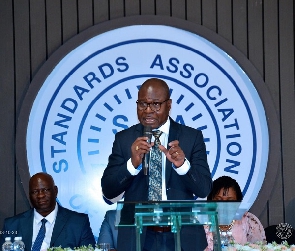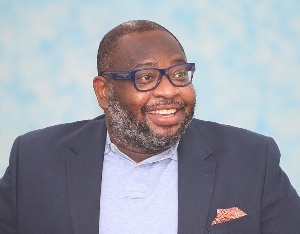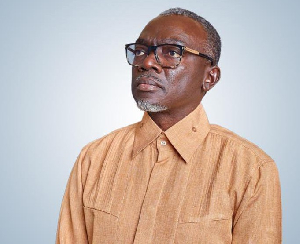The Ghana Standards Authority has trained and employed about 300 Trading Standards Inspectors to help enforce standards nationwide.
It is also to ensure goods imported and produced in the country are standardised.
Professor Alex Dodoo, Director-General GSA, speaking at an event to climax a flag-raising ceremony of the World Standards Day in Accra assured stakeholders of the Authority’s readiness to protect the lives and well-being of Ghanaians by putting in place a solid infrastructure, which includes systems and people to ensure standardisation.
The year’s event was on the theme: “Shared Vision for a Better World: Standards for Sustainable Development Goal 3(Good Health and Well-Being).
World Standards Day is celebrated annually on October 14, to honour the joint efforts of numerous experts across the world who voluntarily develop the technical agreements which are issued as international, regional, or national standards.
It also offers an opportunity to increase understanding of the importance of standards.
He said the Authority was installing various management systems, including iso 9001, which would help them become efficient.
He said having standards required that they were enforced, adding that in 2022 the Authority got a new Act which provided GSA powers to enforce these standards.
“The coming into force of the National Quality Policy and GSA’s five-year strategic plan are to ensure the protection of society, lives and good health,” he added.
Ms Joyce Okoree, Director, Standards Directorate, GSA, said the event sought to raise awareness of the importance of standards to global development.
She said the emphasis on providing a better and fair world with more sustainable activities was vital because humans keep degrading the environment daily in diverse ways which is affecting the health and well-being of citizens.
“In a bid to create a better world for the present and future generations, adherence to standards is critical to make this shared vision a possibility,” she added.
She said the practical solutions provided by standards in all aspects of an economy have become more relevant as stakeholders sought to achieve the SDGs to build a better world.
The Director said a world without standards would be a world full of chaos, social imbalances, collapsed businesses and failed communities where individuals only look out for personal gains and profit.
She said standards had provided a fair playing field for all businesses and for consumers to get value for money in any exchange.
“The SDGs can only be achieved through the collaboration of many public and private partnerships and the use of all available tools such as international standards and conformity assessment,” she said.
Ms Okoree said standards developed empowered nations with real-world solutions to address the targets set out in the UN SDGs.
She said that developed by thousands of experts from all over the world, standards embodied global expertise and best practices to ensure goods and services are safe, sustainable, and work effectively and responsibly.
She called on the government, stakeholders, partners, and the public to make use of the Authority’s standards to ensure an efficient and robust economy.
Prof. Felix Mills-Robertson, the Board Chairman of GSA, said standards were the invisible threads that weave the fabric of progress.
He said in the realm of healthcare, they were the guiding principles that ensure the safety, efficacy, and accessibility of medical services and products.
“By adhering to these standards, we guarantee that the medicines we consume, the treatments we receive, and the technologies we rely on are of the highest quality,” he added.
He said the Authority was dedicated to fostering a culture of standardization in healthcare and they were committed to ensuring that our nation’s health sector is fortified by robust standards that guarantee the well-being of our citizens.
He said through rigorous research, meticulous testing, and continuous innovation, they strived to elevate healthcare standards in Ghana, setting an example for the entire continent.
He said by embracing cutting-edge technologies, “we can enhance medical research, improve diagnostics, and develop groundbreaking treatments.”
Prof Mills-Robertson said moreover, collaboration stands as the cornerstone of progress, and they must collaborate across sectors, borders, and ideologies to leverage our collective knowledge and resources for the greater good.
He urged every citizen to recognize the importance of standards in shaping the present and safeguarding our future.
“Let us be advocates for health and well-being, championing the cause of accessible healthcare for all. Let us demand that our governments, institutions, and industries prioritize the implementation of standards that protect our health and enhance our quality of life,” he added.
Certificates were presented to participants of the African Organisation for Standardisation (ARSO) Essay Competition for the 2022/2023 Awards.
Business News of Friday, 20 October 2023
Source: GNA

















